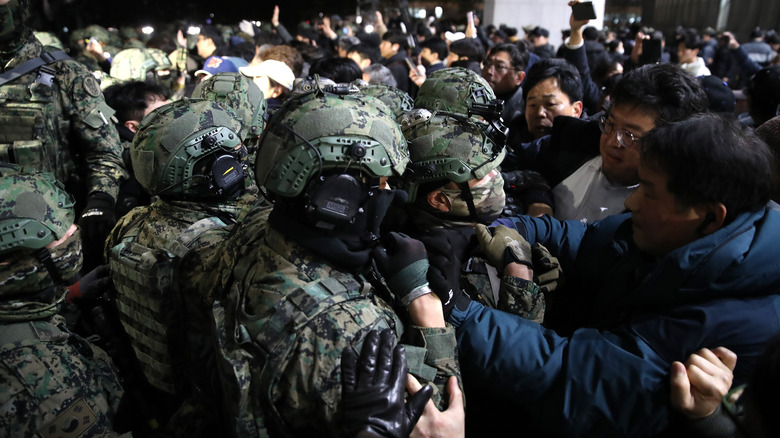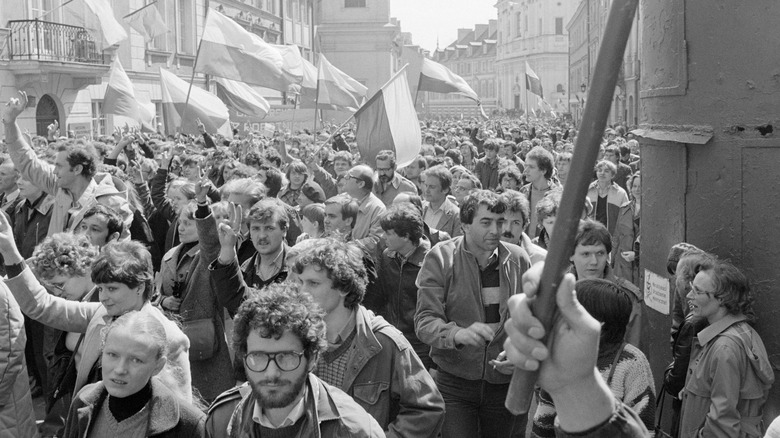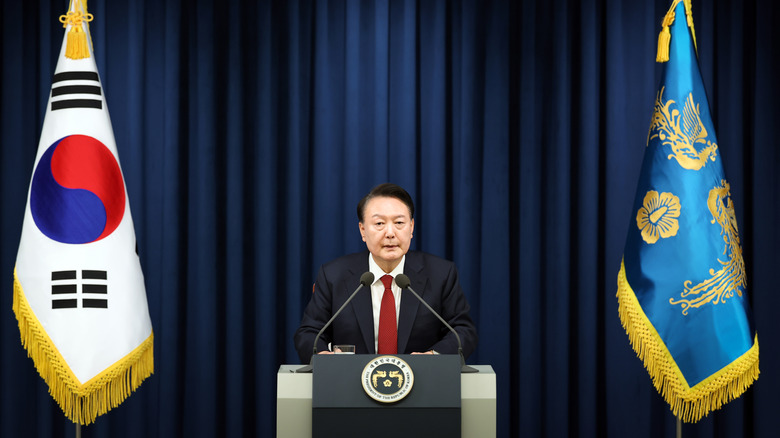Here's What Happens When A Country Declares Martial Law
Martial law: It's a prospect that haunts political operators and fiction writers alike. The idea of the military seizing control of the functions of the state would be, for many, an emergency in and of itself, and its use throughout history in times of war, disaster, and disorder only further darkens its reputation. And yet, the concept of martial law is poorly stipulated. The United States Constitution doesn't define "martial law" or even mention it, Congress has never passed legislation regarding it, and the courts have a murky and inconsistent record on it. The handful of times martial law has been employed in the United States have typically been on the state level, and even then, the intended meaning of the declaration has varied. Britain's definition is similarly opaque.
The nebulousness of martial law has been a defining trait of the concept throughout history. But however vague the general consensus might be, it still broadly defines martial law as a period in which military authorities displace civil authorities. And for some countries, it's been an unfortunately frequent occurrence. In the aftermath of the Korean War, South Korea saw numerous declarations of martial law, particularly under the dictatorship of Park Chung-hee and most recently in a quickly-thwarted plot by President Yoon Suk Yeol in December 2024. Elsewhere, the Russo-Ukrainian War has seen both sides deploy martial law. These examples and others provide some examples of what can actually happen under a declaration of martial law in the modern world — and what the limits of such declarations might be.
Civil rights can be curtailed under martial law
Visit Ukraine makes a point of listing the civil rights that were not restricted by the declaration of martial law in the country as part of its campaign in the Russo-Ukrainian War. Specific articles in the country's constitution forbid restrictions on equality before the law, the right to citizenship, protections from torture or cruel and unusual punishment, the presumption of innocence, and others. That such provisions are made in the Ukrainian Constitution, and that any pro-Ukrainian group would feel compelled to advertise them, speaks to one of the most frightening things about martial law: The temporary curtailing of civil liberties in the name of order.
While protecting some rights under its constitution, Ukraine does allow martial law to restrict freedom of movement, labor, and "participation in public affairs." The latter two restrictions can be turned toward military strategy — they prevent Ukrainian men of prime fighting age from leaving the country, and a 2024 expansion on the power limited consular services offered to Ukrainian men living abroad who didn't update their military registration. Martial law can serve as a pretext for suppression outside of a wartime scenario. In 1981, the Communist government of Poland imposed a two-year martial law at Moscow's request. The power was triggered by labor strife and spawned mass imprisonment and loss of life.
Martial law is (supposed to be) temporary
Martial law is not meant to last. As vague and varying as its definition is, a consistent idea behind the power is that it is only invoked in an emergency situation and only lasts as long as the crisis. Per The New York Times, the South Korean constitution explicitly justifies the use of martial law only when "required to cope with a military necessity or to maintain the public safety and order ... in time of war, armed conflict or similar national emergency." The same constitution also provides a mechanism for ending martial law that doubles as a safeguard against abuse of the concept. A majority vote in parliament can rescind the president's declaration of martial law, which is exactly what happened only hours after President Yoon Suk Yeol tried enacting martial law on the grounds of alleged pro-North Korean influence in the opposition party.
But not every country allows for martial law to be so easily lifted. Indeed, without a clear mechanism for ending, martial law can last indefinitely. And once it's enacted, there's always the possibility for expansion. Russian President Vladimir Putin signed a presidential decree to enact martial law for the Ukrainian districts illegally seized by Russia in 2022. The following year, he submitted legislation to the Russian parliament, Duma, to ease any such declaration over Russia proper.


